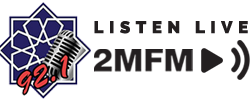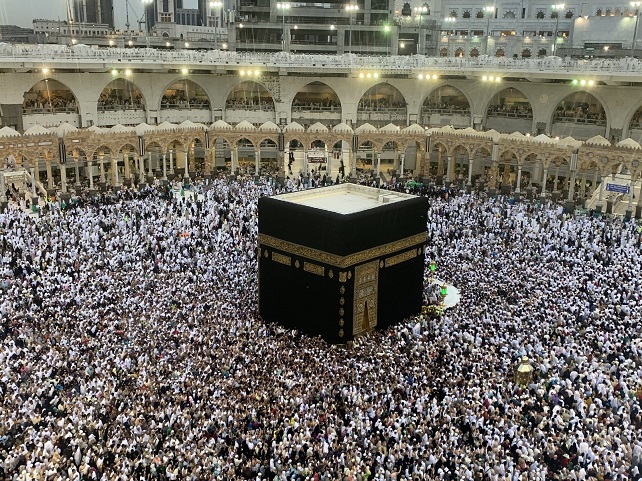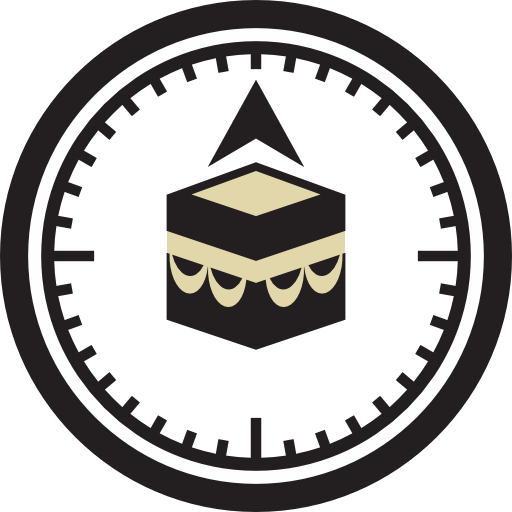What one does to enter into the actions of Hajj or ^Umrah (become in the state of ihram).
The first integral step for the person intending to travel to Makkah to perform the Pilgrimage (Hajj) is to establish the intention in his heart to enter into the actions of Pilgrimage (Hajj or ^Umrah).
It is this intention and not just donning the clothes of ihram which causes one to become in that state. Going into the state of ihram means intending to enter into the actions of Hajj or ^Umrah during which certain things are obligatory on one to do and certain other things are prohibited for one to do.
Establishing this intention and going into the state of ihram must be done before the person crosses the miqat (The miqat is the place that a person must cross while having the intention of performing Hajj or ^Umrah), and may be done from one’s hometown. However, once the person establishes the intention and goes into the state of ihram, he must avoid all those things which are prohibited for him to do while in this state. Crossing beyond these miqats or what aligns with them before first entering into the state of ihram is unlawful (sinful) and requires an expiation.
These miqats were established by the Prophet and depend on the person’s route of travel to Makkah. The miqat for the people coming by route of al-Madinah is Dhul-Hulayfah (Abar ^Aliyy), a location less then ten (10) miles outside the city of al-Madinah, where the pilgrim may wash, change his clothes, pray, and make the intention.
It is sunnah to perform a purificatory bath (ghusl) before making the intention to enter into the state of ihram and to put perfume on the body, but not on the clothes intended for wearing for the ihram. It is sunnah to wear white clothes, and either new ones or clean used ones. One must take care to refrain from wearing the clothes forbidden for him to wear once he becomes in the state of ihram. The man wears an izar (what covers the lower part of the body) and a rida’ (what covers the upper part of the body)—without either being sewn or felted to fit the body—like a huge towel or shawl. The man must take care also not to wear shoes sewn to fit the foot, rather he wears shoes that uncover the toes and the back of the feet. The man may put on a belt to hold up his clothing. The woman may wear sewn clothes, and must cover all her ^awrah. She may not wear gloves to cover her hands though her sleeves may be long enough to do so. She may not cover her face with anything which touches the skin of her face.
Before one makes the intention of ihram it is sunnah to pray two (2) rak^ahs, with the intention of performing this sunnah for ihram, and to recite Surat al-Kafirun in the first rak^ah after the Fatihah, and Surat al-Ikhlas in the second rak^ah after reciting the Fatihah. Then, one faces the Qiblah and says to oneself:
I now start the actions of Hajj, (I now engage in the actions of Hajj.)
دخلت فى عمل الحج
Then to say out loud:
O Allah, I now perform Hajj to obey You in answering Your order.
لبيك اللهم بحج
Then the man says the following statement out loud (the woman with a low voice). It is called the talbiyah:
O Allah, I obey Your Order. I obey You one time after the other. O Allah, I obey Your Order. You are the One Who does not have any partner. I obey You one time after the other.
لبيك اللهم لبيك، لبيك لا شريك لك لبيك،
You are the One Who deserves to be praised and thanked. Every endowment is from You. You are the One attributed with Dominion.
إنّ الحمد والنعمة لك والملك
There is no partner with You.
لا شريك لك
Then, one makes du^a’, asking Allah to raise the rank of Prophet Muhammad, and to accept one’s deeds, grant one Paradise, and protect one from Hellfire. Then, one makes other du^a’ for oneself and for whomever one wishes. It is good to repeat the talbiyah often. Should one see something which one likes or something which one dislikes, one says:
I obey You (O Allah). Surely, the valued living (meaning the living which does not have any hardships) is the living in the Hereafter (in Paradise).
لبيك إن العيشَ عيشُ الآخرة
If one sees something which one likes, these words are reminders that the pleasures in Paradise are much, much more than the pleasures on Earth. Should one see something one dislikes, these words help one to be patient by occupying one’s mind in how to escape Hellfire and get to Paradise, where one would not be disturbed by such matters.







